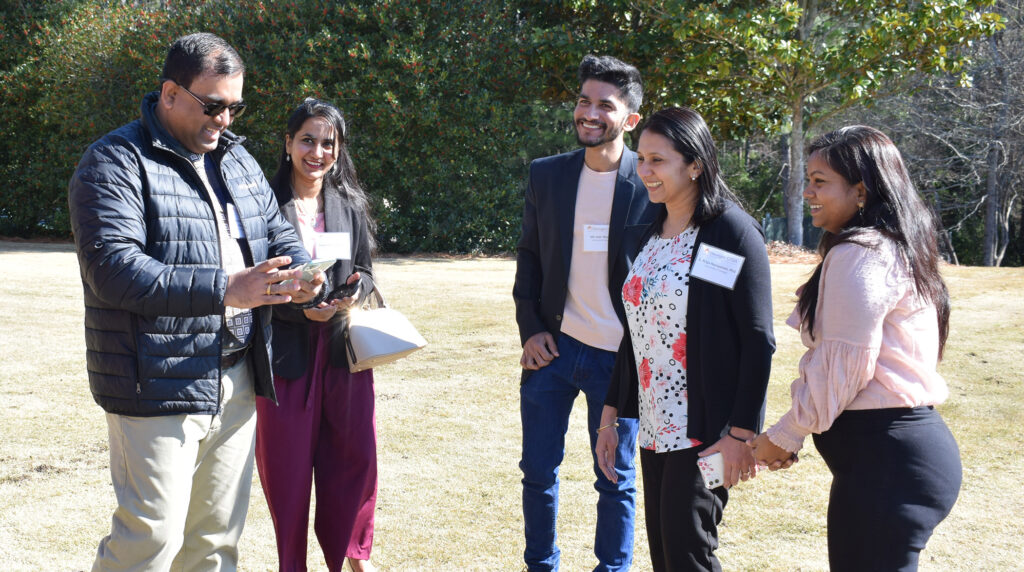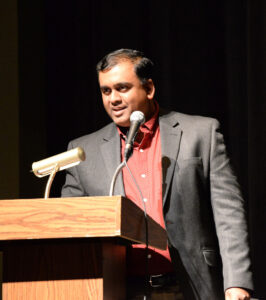Somanath Shenoy, a professor in the College of Pharmacy, conducts research that aims to identify new ways to detect and treat lung diseases and cancer by understanding what is happening on the cellular level.
When did you come to UGA and what brought you here?
I came to UGA in March 2009. I was hired as an assistant professor in the graduate program in clinical and experimental therapeutics on the Augusta campus of UGA’s College of Pharmacy.
As a postdoc, I worked at Kent State University and the Cleveland Clinic in Ohio. At Kent State, I had the opportunity to engage in undergraduate and graduate training programs as I pursued my postdoctoral research. In contrast, the career development training at the Cleveland Clinic was intensely research-oriented. Having both these experiences resulted in my search for a career that encompassed both graduate teaching and translational research. At UGA, I found that perfect mix. Here, I have the luxury to be part of the professional (Pharm.D.), graduate (M.S. and Ph.D.) and residency certificate programs and also train basic science and professional students/residents on translational research. Being on the Augusta campus, I was given another fortuitous opportunity to collaborate with the clinical faculty at Augusta University and the Charlie Norwood VA Medical Center in addition to my clinical colleagues within our department of clinical and administrative pharmacy. I’ve been here for 10 years and thoroughly enjoy what I do at the University of Georgia.
What are your favorite courses and why?
Although research is my passion, I equally enjoy lecturing. I coordinate a dozen didactic and experiential courses and am an instructor on several other courses. One of my favorite courses is “Drug Targets in Signal Transduction” because it prepares the students to undertake a research project with a firm understanding of the fundamentals of physiology and pathology. It is a very challenging course, but I can see the impact on the students as they then go on to use that knowledge to design and defend their research projects. Equally favorite is the “Advanced Therapeutics” course that trains basic scientists to think translational.
How do you describe the scope and impact of your research or scholarship to people outside of your field?
I am a biomedical scientist who specializes in translational research in lung diseases and cancer. My research aims to identify new ways to detect and treat these two diseases by understanding what is happening on the cellular level.
How does your research or scholarship inspire your teaching, and vice versa?
In academia, scholarship and teaching are two sides of the same coin. They are inseparable and highly interconnected. Pursuing novel science and innovative ideas in research is something that drives success with high-impact research publications and extramural grant funding. Staying current on the scientific advances and identifying the gaps in our knowledge bank is critical for academic success. My research enables me to disseminate the most up-to-date information to graduate and undergraduate students. While teaching, we also brainstorm ideas and keep ourselves abreast of the latest reports in the field. The scientific discussions I have had with students are very rational and zealous. Teaching also has bestowed on me the ability to think about how classroom lecturing and research training can be improved through research and the development of massive open online courses (MOOCs). As a prime example, I was able to represent UGA as the co-director of the NIH-funded training programs in its alliance with Emory University, Georgia Tech and Morehouse School of Medicine that form the Georgia Clinical and Translational Science Alliance (Georgia-CTSA). Through this alliance, I was able to lead an NIH-funded research supplement project focused on developing online courses for dissemination to the partnering institutions.
What do you hope students gain from their classroom experience with you?
We have two kinds of students coming to our programs. On one end, we have Pharm.D. students and residents who understand the language of clinicians and what it takes to treat a disease but have limited understanding of how these medications were developed through years of basic and translational research. On the other end, we have M.S. and Ph.D. graduate students who dissect out the mechanisms of disease and identify drug targets for treatment but are less informed on how their research is being taken to the bedside. To address this, I created a broad, multidisciplinary research training program encompassing postdoctoral fellows, graduate students, professional students and residents that extends from the laboratory to the bedside. This training environment is significant as it educates people to be successful in the changing landscape of biomedical research. My trainees are able to move into their respected health care fields as practitioners and researchers with a firm mutual understanding of each other’s knowledge.
The one UGA experience I will always remember will be …
All my “firsts” at UGA are super special to me. If I have to pick one, it would be the phone calls from my family in India in fiscal year 2015 when two press reports highlighting our UGA research on lung fibrosis and prostate cancer hit the news headlines in leading newspapers worldwide.

